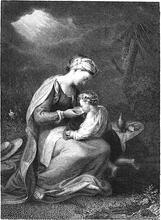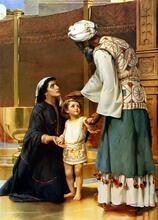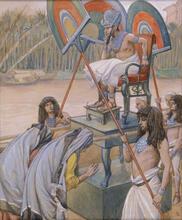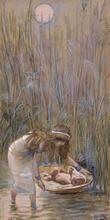Hannah Mother of Seven
The mother of seven is a nameless figure from II Maccabees who was arrested and died along with her seven sons for defying the decree of the Seleucid monarch to transgress the commandments of the Torah. Her death is only briefly mentioned in II Maccabees, while a retelling of the story in IV Maccabees describes it as a suicide. Her story is retold in rabbinic and medieval literature, where she is named both Miriam and Hannah. In rabbinic literature she is again described as committing suicide and argues that the severity of her trials surpassed even Abraham’s.
The Mother of Seven In Maccabees
In the Second Book of Maccabees (II Maccabees, Chapter 7) a story is told of a (nameless) mother of seven who was arrested with her sons for defying the decree of the Seleucid monarch to transgress the commandments of the Torah she-bi-khetav: Lit. "the written Torah." The Bible; the Pentateuch; Tanakh (the Pentateuch, Prophets and Hagiographia)Torah. Refusing to capitulate to the king’s demands, the sons were tortured to death one by one. Instead of persuading them to desist, their mother encouraged them to die for their belief. The story ends with a short note to the effect that after the death of her sons, she too died. In contrast to the elaborate description of their death, hers is merely mentioned, not described.
The story of the mother of seven sons is further elaborated in the first-century CE composition, IV Maccabees. This is substantially a retelling of the II Maccabees story, with philosophical justification added to it. The woman remains nameless but her death is described as suicide, perpetrated so as to escape abuse by her captors.
Miriam Mother of Seven In Rabbinic Literature
In rabbinic literature the story undergoes some more meaningful changes, primarily a chronological shift, which now places the story in the aftermath of the Bar Kokhba Rebellion and the decrees it brought with it, namely in the second century CE. The rabbis tell the story twice: Once in the The discussions and elaborations by the amora'im of Babylon on the Mishnah between early 3rd and late 5th c. C.E.; it is the foundation of Jewish Law and has halakhic supremacy over the Jerusalem Talmud.Babylonian Talmud, where the woman remains nameless (BT Writ of (religious) divorceGittin 57b) and once in Lamentations Rabbah (1) where she is designated Miriam daughter of Tanhum. The version in Lamentations Rabbah is much longer but both versions preserve the idea that only the sons were martyred, while the mother committed suicide. Her role is much enhanced in the rabbinic version, because she both nurses the youngest of her sons, who is said to have been only six years old, and through him sends a message to Abraham, telling him that her trial was much more severe than his had been when he was asked to sacrifice Isaac.
Hannah Mother of Seven in Medieval Literature
The name Miriam was probably acquired through similarity to three other women mentioned in this composition, all of them victims of wars, all also called Miriam. Only in late medieval reworkings of the story is she designated Hannah. The first instance of this name is version C of the Book of Josiphon, dating, according to Flusser, to 1160 CE (Josiphon 15:1, Flusser edition, n. 1). He has suggested that the name was invented based on a verse from the Song of Hannah (mother of Samuel) in the Hebrew Bible, which states “The barren woman bears seven” (1 Samuel 2:5). This name became common in popular retellings of the story.
Boyarin, Daniel. Dying
for God: Martyrdom and the Making of Christianity and Judaism. Stanford:
1999.
In this book Boyarin discusses the Jewish martyr stories, including that of
the mother, within the Jewish-Christian discourse on Martyrdom in late antiquity.
Cohen, Gershon N. “Hannah and her Seven Sons.” In Studies
in the Variety of Rabbinic Cultures. New York: 1991, 39–60.
An attempt to trace the development of this legend from antiquity to the Middle
Ages.
Duran, Robert. “The Martyr: A Synoptic View of the Mother and Her Seven Sons.”
In Ideal
Figures in Ancient Judaism: Profiles and Paradigms, edited by
J. J. Collins and G. W. E. Nickelsburg, 189–221. Chico, CA: 1980.
In this article all the versions of the story of the mother and seven sons
are discussed and compared.
Guttman, Joshua. “The Mother and Her Seven Sons in Legend and in Books II
and IV Maccabees” (Hebrew). In Johanan
Levi Memorial Volume, edited by M. Schwabe and J. Guttman,
25–37. Jerusalem: 1949.
This study traces the development of the mother-and-seven-sons tradition from
Jewish to Christian martyrological legend.
Hazan-Rokem, Galit. The
Web of Life: Folklore and Midrash in Rabbinic Literature. Stanford:
2000, 108–129.
This chapter is a sophisticated folkloristic analysis of the mother and sons
story within the context of Lamentations
Rabbah.
Rajak, Tessa. The
Jewish Dialogue with Greece and Rome: Studies in Cultural and Social Interaction.
Leiden: 2001, 99–133.
This chapter is a discussion of the story of the martyrdom of the mother and
seven sons within the context of ancient Greek discourse.
van Henten, Jan Willem. The
Maccabean Martyrs as Saviours of the Jewish People: A Study of 2 and 4 Maccabees.
Leiden: 1997.
A careful literary analysis and historical contextualization of Jewish martyr
stories in II and IV Maccabees, including the story of the mother and seven
sons.
Young, Robin D. “‘The Woman with the Soul of Abraham’: Traditions about the
Mother of the Maccabean Martyrs.” In ‘Women
Like This’: New Perspectives on Jewish Women in the Greco-Roman World, edited
by Amy-Jill Levine, 67–81. Atlanta: 1991.
Feminist-literary analysis of the mother’s martyrdom story in II and IV Maccabees.








